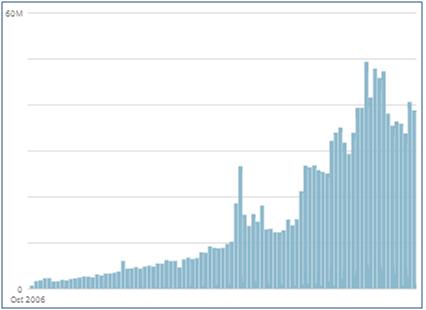The future of blogging: Multimedia of life
- Subscribe to RSS Feed
- Mark as New
- Mark as Read
- Bookmark
- Subscribe
- Printer Friendly Page
- Report to Moderator
- Plusnet Community
- :
- Plusnet Blogs
- :
- The future of blogging: Multimedia of life
The future of blogging: Multimedia of life
 From personal diaries to providing fashion advice, more people are joining the blogosphere. But how has blogging changed and what is its future? Plusnet has looked into the changes in blogging with help from some keen bloggers to give you an insight into where this pastime-come-industry has come from and where it may be heading.
From personal diaries to providing fashion advice, more people are joining the blogosphere. But how has blogging changed and what is its future? Plusnet has looked into the changes in blogging with help from some keen bloggers to give you an insight into where this pastime-come-industry has come from and where it may be heading.
Where has blogging come from
Blogging has been around for the best part of two decades. The term ‘weblog’ was first used by American Jorn Barger as he chronicled his interests on the web in the hope that other like-minded people may come across his site, Robot Wisdom. Over time, the term has been shortened to ‘blog’ with authors being called ‘bloggers’ largely thanks to the founder of Blogger, Evan Williams. Evan’s platform swelled in popularity, eventually being bought by Internet behemoth Google. But as blogging became more popular, new sites such as Wordpress (now with over 60 million websites), Typepad and Tumblr began to emerge.
Why do people blog
Thomas, who currently maintains 13 blogs on various topics, focusing on genealogy and High-Definition Genealogy advises that he has various reasons for blogging:
“I need a creative outlet; I need to preserve my family history; I also need to market my genealogy business in an economical fashion. For me, blogging is not a soapbox or an ego thing where it is all about me; instead, blogging is about community and connecting with others.”
The creative view is also shared by Lela London, a highly popular fashion blogger on her site Lela in London.
“I wanted an extra way to be creative but it eventually became the only way I wanted to be creative”.
But it is not just for personal reason that people use blogging. Company Shake Social offers a bespoke blogging service and founder Kate Tyler says “blogging became an integral part of their content marketing strategy” for their business. Blogging has changed rapidly and its growth has been significant. But will this remain and what exactly does the future of blogging look like? Here are our thoughts and predictions with insight from our expert bloggers.
#1: Blogging will continue to become more accessible
Blogging will keep getting easier for more people to be actively involved online, creating and sharing content. The amount of people involved will continue to rise steadily, proving Thomas’ insight that “more and more everyday people are finding that having a blog gives them a voice” correct.
#2: Blogs are with us for the long haul!
The number of people blogging, the platforms available, and the awareness of blogging as a whole will continue to grow. The year on year graph from Wordpress’ stats page shows a significant growth in the amount of posts published a month compared to 2006. 
“The need to document and log experiences, ideas, content and advice is fairly timeless, so blogs will always serve a purpose, even if the vehicles for doing so change”, says Kate.
When we look back into history we see countless written records of peoples’ daily lives, so it makes sense that this will follow the trend of the times and become a digital pursuit.
3: The tools for blogging will change, but the core platforms will remain strong
Bloggers are looking for new ways of enhancing their blog both visually and in terms of the content they curate. Content created through Instagram, Snapchat, Vine and similar tools will be integrated just as freely as YouTube videos have. Thomas says: “I see blogging merging with life streaming so that various forms of multimedia can be easily integrated into blog posts” The bloggers we spoke to predicted that more services would become available which focus on different content mediums. Kate notes “the rise of video as an integral part of blogging platforms” and has been an important development in recent years. She also predicts a “continued shift towards the visual in blogging, from photos to memes to video”.
#4: Bloggers will continue to become more accepted and influential
The voice of the blogosphere will become more and more important in terms of news and opinion. We’ve seen news stories that have broken over Twitter in the past, and this will become more frequent as the amount of tools and accessibility increases. Lela has noticed since she began blogging that “bloggers have started to become more accepted in the mainstream”, and this is well documented by the rise of opinion blogs, inclusion of blog contributors on news sites, and the increasing trend of businesses using blogging. She also says that “bloggers are quickly becoming more powerful than traditional media platforms”, and believes that this “will only become more evident in the coming years”. Lee Simspon, co-founder of Blogbranch an online guide to blogging and has a vast understanding of the role of bloggers. His thoughts on the subject of bloggers as influencers are interesting, noting that “professional bloggers and YouTube celebrities are the gate keepers to a huge market of highly engaged consumers and brands [and] have began to leverage this to their advantage”. Their ability to do this is bolstered by the fact that “some lifestyle and fashion bloggers have monthly traffic comparable to large media organisations and they're doing it with half the overhead”
#5: Blogs will become more integral in business strategy and website design
Businesses will take advantage of the continued rise in blogging by incorporating it into their marketing strategies. Blogs will feature on more business sites and will be used more as a method of making announcements, keeping customers in the loop, and interacting with them. “It is this merger of personal, professional and public that makes the blogging sphere so interesting”, says Kate. The benefits are wide reaching for businesses who engage with blogging: not only do they engage with their customers in a public setting, but “you optimise your search engine results, you also reinforce your expert credentials [and give] people a reason to visit your website again and again”. Kate warns, however, that “companies that treat [blogging] as a fad – something to be given cursory treatment to only – are unlikely to see any real benefit from it”. Lee told us that “brands have begun using their blogs as an aggregator for all these social channels - increasing their reach and giving customers a chance to discover all of the touch points across the web.”
#6: There will be debates on legality of content ownership
All of the predictions so far have been positive but we think there will be some tough debates to be had around blogging. One question we think will be asked is ‘who owns blog content’? This is especially relevant when an employee writes for a company blog but moves onto another company – does the employee or the company own the content? Kate predicts “legal repercussions of our digital footprints in the long term”, posing the question “who technically owns the subscribers to / influence of a blog?” This is indeed an interesting issue, especially with the increasing prominence of tools such as Google Authorship which can track an author’s output around the web. We’re sure this is a debate that we’ll hear more about in coming years.
What do you need to know about blogging?
Thomas, Lela and Kate have also offered their advice for anybody looking to set up their own blog in the future. Thomas:
- First, read lots of other blogs to get ideas; look for layout, format, which platform they use (Blogger, WordPress etc.), and focus on their voice and audience
- Make sure you have a Welcome post and an About section or page so readers can get to know you
Lela:
- Just do it!
- As long as you're doing it for yourself (not for money or not begrudgingly), you're doing it right
Kate:
- Audience is key
- Before writing, consider the question “Will your content be useful?
- Think carefully about WHAT the purpose of your blog is, WHO you hope will read it and WHEN you will post. Put together a strategy and a schedule and stick to it
We think that Thomas summarised the appeal of blogging, and the drive for more varied blogging technologies perfectly:
“We’ll be able to leave a legacy as to who we were and why our lives mattered in just the tap of a screen or click of a button”.
Our closing thoughts come from Lee:
“Lots of bloggers see the creation and curation of content as an expression of themselves, their peer group and their generation. It’s not unlike being an artist or a musician. Just get out there! Starting a blog is easy, and if you're passionate about something, finding the inspiration for content should be easy too. Getting people to read that content is the tricky part - but building that community around your blog comes with time and experience“.
How do you think blogging will change in the future? Do you read and engage with more blogs now than you used to? Are you tempted to start a blog, or do you have any tips and tricks to share from running one already?
